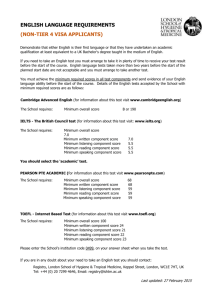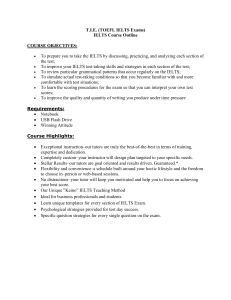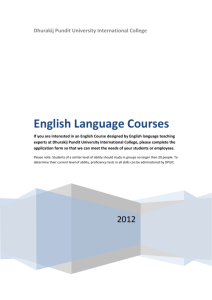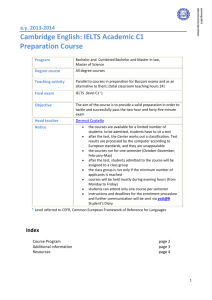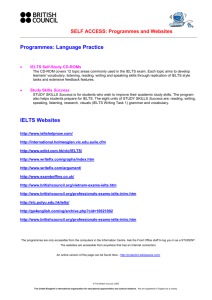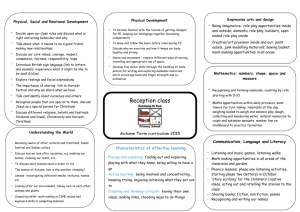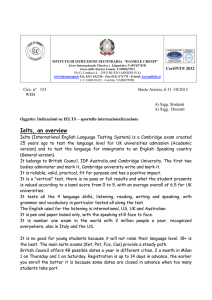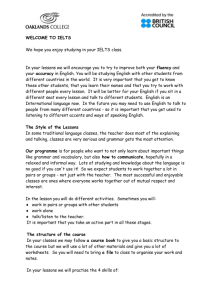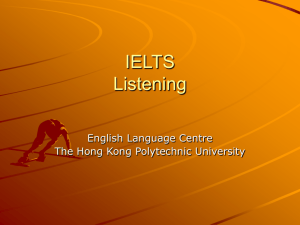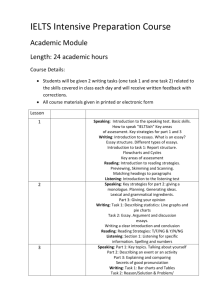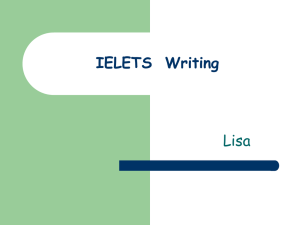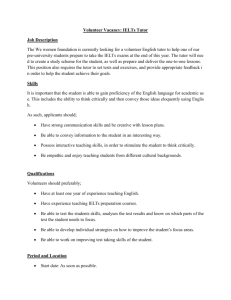Scheme of Work IELTS
advertisement
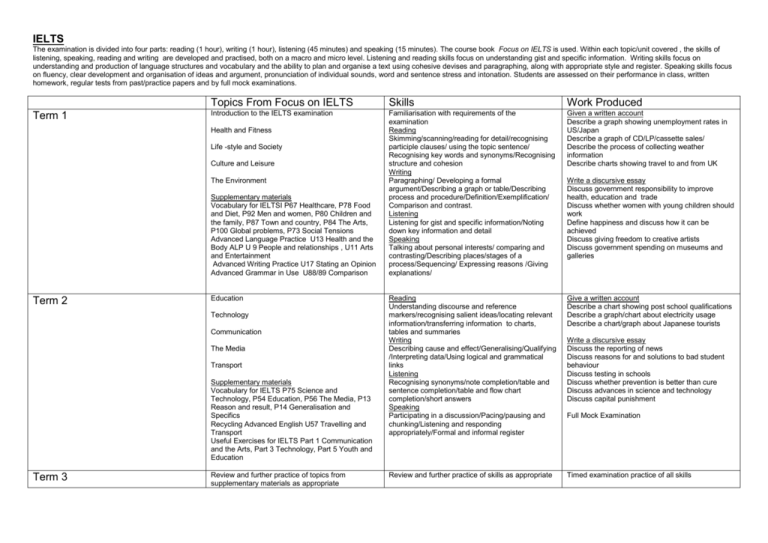
IELTS The examination is divided into four parts: reading (1 hour), writing (1 hour), listening (45 minutes) and speaking (15 minutes). The course book Focus on IELTS is used. Within each topic/unit covered , the skills of listening, speaking, reading and writing are developed and practised, both on a macro and micro level. Listening and reading skills focus on understanding gist and specific information. Writing skills focus on understanding and production of language structures and vocabulary and the ability to plan and organise a text using cohesive devises and paragraphing, along with appropriate style and register. Speaking skills focus on fluency, clear development and organisation of ideas and argument, pronunciation of individual sounds, word and sentence stress and intonation. Students are assessed on their performance in class, written homework, regular tests from past/practice papers and by full mock examinations. Term 1 Topics From Focus on IELTS Skills Work Produced Introduction to the IELTS examination Familiarisation with requirements of the examination Reading Skimming/scanning/reading for detail/recognising participle clauses/ using the topic sentence/ Recognising key words and synonyms/Recognising structure and cohesion Writing Paragraphing/ Developing a formal argument/Describing a graph or table/Describing process and procedure/Definition/Exemplification/ Comparison and contrast. Listening Listening for gist and specific information/Noting down key information and detail Speaking Talking about personal interests/ comparing and contrasting/Describing places/stages of a process/Sequencing/ Expressing reasons /Giving explanations/ Given a written account Describe a graph showing unemployment rates in US/Japan Describe a graph of CD/LP/cassette sales/ Describe the process of collecting weather information Describe charts showing travel to and from UK Reading Understanding discourse and reference markers/recognising salient ideas/locating relevant information/transferring information to charts, tables and summaries Writing Describing cause and effect/Generalising/Qualifying /Interpreting data/Using logical and grammatical links Listening Recognising synonyms/note completion/table and sentence completion/table and flow chart completion/short answers Speaking Participating in a discussion/Pacing/pausing and chunking/Listening and responding appropriately/Formal and informal register Give a written account Describe a chart showing post school qualifications Describe a graph/chart about electricity usage Describe a chart/graph about Japanese tourists Review and further practice of skills as appropriate Timed examination practice of all skills Health and Fitness Life -style and Society Culture and Leisure The Environment Supplementary materials Vocabulary for IELTSI P67 Healthcare, P78 Food and Diet, P92 Men and women, P80 Children and the family, P87 Town and country, P84 The Arts, P100 Global problems, P73 Social Tensions Advanced Language Practice U13 Health and the Body ALP U 9 People and relationships , U11 Arts and Entertainment Advanced Writing Practice U17 Stating an Opinion Advanced Grammar in Use U88/89 Comparison Term 2 Education Technology Communication The Media Transport Supplementary materials Vocabulary for IELTS P75 Science and Technology, P54 Education, P56 The Media, P13 Reason and result, P14 Generalisation and Specifics Recycling Advanced English U57 Travelling and Transport Useful Exercises for IELTS Part 1 Communication and the Arts, Part 3 Technology, Part 5 Youth and Education Term 3 Review and further practice of topics from supplementary materials as appropriate Write a discursive essay Discuss government responsibility to improve health, education and trade Discuss whether women with young children should work Define happiness and discuss how it can be achieved Discuss giving freedom to creative artists Discuss government spending on museums and galleries Write a discursive essay Discuss the reporting of news Discuss reasons for and solutions to bad student behaviour Discuss testing in schools Discuss whether prevention is better than cure Discuss advances in science and technology Discuss capital punishment Full Mock Examination
